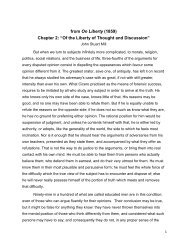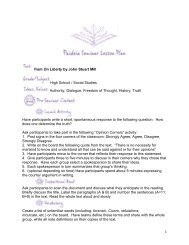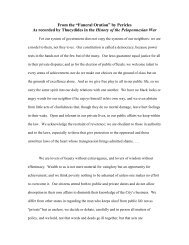Rousseau_contrat-social
You also want an ePaper? Increase the reach of your titles
YUMPU automatically turns print PDFs into web optimized ePapers that Google loves.
First the censors, after having for a long time claimed the right of<br />
transferring citizens arbitrarily from one tribe to another, allowed<br />
most persons to enrol themselves in whatever tribe they pleased. This<br />
permission certainly did no good, and further robbed the censorship of<br />
one of its greatest resources. Moreover, as the great and powerful all<br />
got themselves enrolled in the country tribes, while the freedmen who<br />
had become citizens remained with the populace in the town tribes, both<br />
soon ceased to have any local or territorial meaning, and all were so<br />
confused that the members of one could not be told from those of another<br />
except by the registers; so that the idea of the word tribe became<br />
personal instead of real, or rather came to be little more than a<br />
chimera.<br />
It happened in addition that the town tribes, being more on the spot,<br />
were often the stronger in the comitia and sold the State to those who<br />
stooped to buy the votes of the rabble composing them.<br />
As the founder had set up ten curiæ in each tribe, the whole Roman<br />
people, which was then contained within the walls, consisted of thirty<br />
curiæ, each with its temples, its gods, its officers, its priests and<br />
its festivals, which were called compitalia and corresponded to the<br />
paganalia, held in later times by the rural tribes.<br />
When Servius made his new division, as the thirty curiæ could not be<br />
shared equally between his four tribes, and as he was unwilling to<br />
interfere with them, they became a further division of the inhabitants<br />
of Rome, quite independent of the tribes: but in the case of the rural<br />
tribes and their members there was no question of curiæ, as the tribes<br />
had then become a purely civil institution, and, a new system of levying<br />
troops having been introduced, the military divisions of Romulus were<br />
superfluous. Thus, although every citizen was enrolled in a tribe, there<br />
were very many who were not members of a curia.<br />
Servius made yet a third division, quite distinct from the two we have<br />
mentioned, which became, in its effects, the most important of all. He<br />
distributed the whole Roman people into six classes, distinguished<br />
neither by place nor by person, but by wealth; the first classes<br />
90











